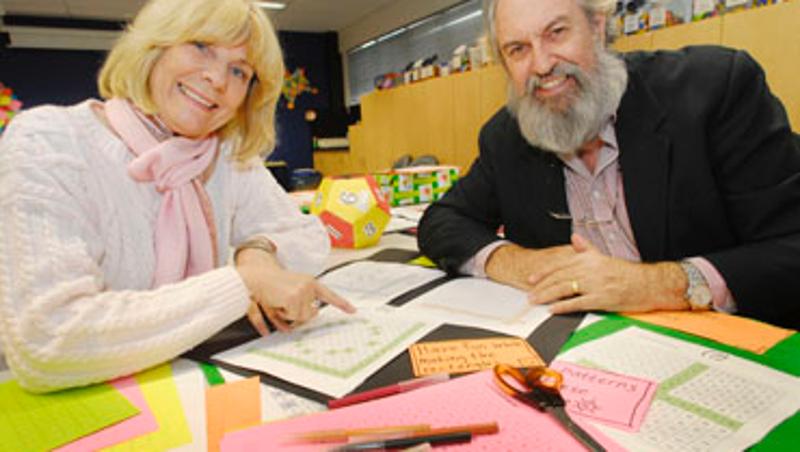
Two QUT academics on a mission to upskill Indigenous Australians by developing culturally relevant teaching methods in maths have received $837,000 in the latest round of ARC Linkage grants.
They, and 21 other research groups from QUT, have received a total of $6.22 million in the latest round of the Federal Government's ARC Discovery and Linkage grants.
The project aims to develop a theory about numeracy instruction, providing strategies for Vocational Education and Training (VET) teachers to assist Indigenous student's mathematics learning in a manner that is culturally empowering, builds pride and sustains community linkages.
Dr Baturo and Professor Cooper have extensive experience in teaching numeracy to Indigenous communities, and are also the founders of the Deadly Maths program which sees them travel to remote Indigenous communities throughout the State.
Dr Baturo said she found working with Indigenous communities a rewarding experience.
"At the start, we had had little experience with Indigenous communities, but we know about mathematics education and hoped that would be enough to be able to help," she said.
"We have had to get out of the way of thinking that we were teaching maths to these kids so they could get a good job, or things like that, and realise that these kids were more interested in learning for the pleasure of gaining knowledge.
"To create effective learning environments, there are many cultural factors which need to be taken into consideration."
The title of Dr Baturo and Professor Cooper's project is Skilling Indigenous Australia: Effective numeracy learning for employment by regional and remote Indigenous students in vocational education and training courses.
QUT received a total of eight ARC Linkage grants, listed below:
Performing Arts, $290,000: Remote Music Interactions Through Online Networks.
Curriculum Studies, $837,000: Skilling Indigenous Australia: Effective numeracy learning for employment by regional and remote Indigenous students in vocational education and training courses.
Public Health and Health Services, $110,000: Pathways to healing: determining effective care pathways for chronic wounds for timely healing, prevention and cost effectiveness.
Curriculum Studies, $165,000: Implementing Engineering Experiences in the Middle School.
Curriculum Studies, $200,000: What teachers do with the official curriculum: A quantitative study of factors influencing the curriculum in use.
Business and Management, $445,000: The contribution of project leader behaviours to processes and outcomes in large scale.
Building, $313,680: Reforming the procurement of construction and financing of Australian infrastructure: Advancing capacity, competition and investment.
Human Movement and Sport Science, $250,000: Understanding Tendon Response to Sport and Exercise: Implications for Optimising Training, Injury Prevention and Accelerated Rehabilitation.
QUT also received 14 Discovery Project grants:
Performing Arts, $340,000: Smart Music: Combining music perception and algorithmic composition.
Curriculum Studies, $330,000: Restructuring Statistical Reasoning in the Early School Years: A Longitudinal Study of Data Modelling.
Applied Economics, $221,000: Should rational individuals be optimistic? Theory, survey evidence, experimental evidence, and policy implications.
Biomedical Engineering, $330,000: Design and Fabrication of an Engineered Bone Graft System (EBGS) by combining a composite scaffold and growth factor delivery system.
Physical Chemistry, $120,000: Developing high flux ceramic membranes via in situ synthesis of metal oxide nanofibres for separations of biological substances.
Information Systems, $225,000: Personalised Ontology Learning and Mining for Web Information Gathering.
Civil Engineering, $330,000: An Integrated Thermal and Structural Investigation for the Development of Innovative Lightweight Cold formed Steel Wall and Floor Systems under Fire Conditions.
Atmospheric Sciences, $290,000: Nanoparticle from urban transport: Quantification of formation and dynamics for application for health and environmental risk reduction.
Mathematical Science, $300,00: Inter fragmentary movement in callus formation in the early phase of fracture healing.
Professional Development of Teachers, $250,000: Emotional Transitions: Exploring Professional Transitions of Science Teachers.
Mathematics, $185,000: A multi scale approach for modelling coupled transport in heterogeneous and anisotropic porous media.
Professional Development of Teachers, $170,000: The role of subject- matter knowledge in teaching science and mathematics: Practices of teachers with advanced qualifications in the sciences.
Applied Economics, $280,000: Determining urban water conservation and management strategies: a novel approach using field experiment and survey data.
Atomic and Molecular Physics; Nuclear and Particle Physics; Plasma Physics, $230,000: Improving the efficiency of silent discharge plasma systems through an effective high voltage power converter design match.
Media contact: Sharon Thompson, QUT media officer - 3138 4494 or sharon.thompson@qut.edu.au


